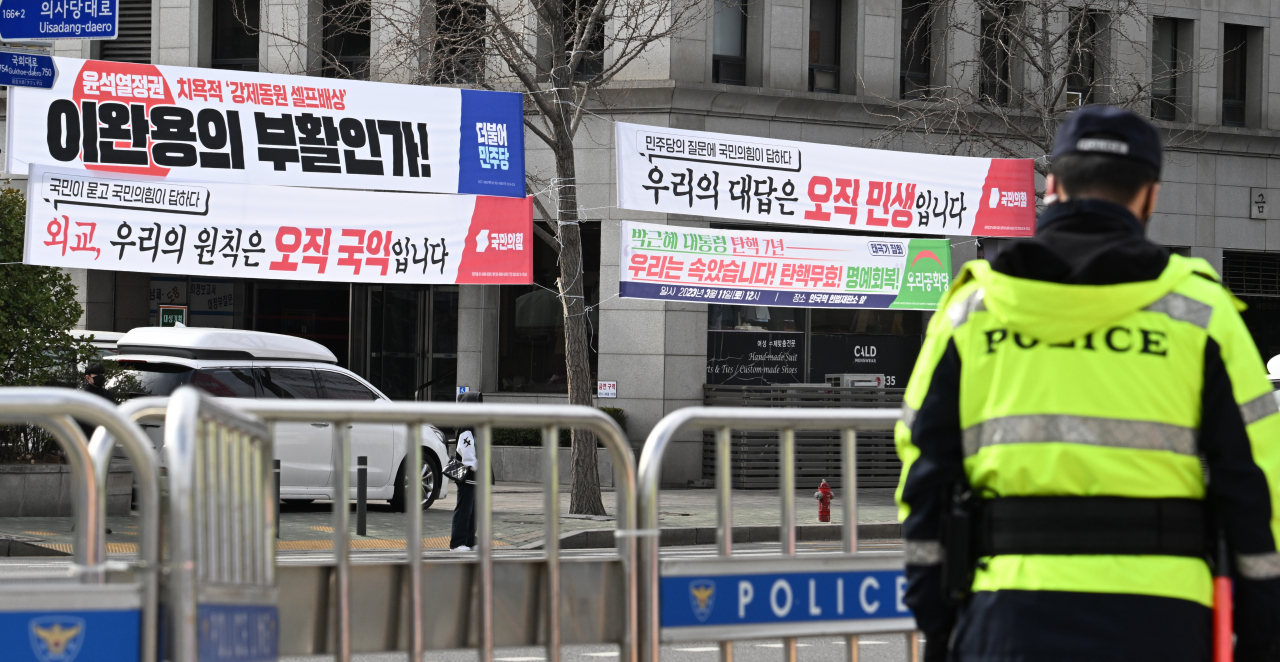'Banner politics' plaguing the streets
Complaints grow over pitfalls, trash problem of 'excessive' political banners
By Kim So-hyunPublished : March 14, 2023 - 15:44

Last month, a college student on an e-scooter fell after her neck got caught on a thin rope from a political banner that was tied to a post, at a crossroad at around 9 p.m. in Yeonsu-gu, Incheon.
The vocal music major suffered an abrasion on her neck. She said she didn’t see the rope as it was too dark.
Anyone who has passed through an intersection in South Korea, especially in Seoul, would have noticed large political banners, as well as many other placards advertising various businesses from gyms to fortune tellers.
It could be outright political slogans like “Investigate (first lady) Kim Keon Hee” or more nuanced phrases, such as “Yeon-jin, is your dad a prosecutor too?"
The latter reference draws from the main villain in the popular Netflix series "The Glory" and is a veiled criticism of Yoon Suk Yeol, a prosecutor turned president, and his many former-prosecutor associates who have assumed positions within the government.
Politicians from governors and lawmakers to local councilors and local branches of parties hang banners with various messages to remind people of their presence, including well-wishes ahead of major holidays Seollal and Chuseok.
The number of such signs has increased after a revised law took effect in December last year to allow political parties to freely display banners on party policies or political issues “within the ranges of usual party activities” for 15 days without getting approvals or reporting to the authorities.
According to one banner vendor, two banners of the size that political parties usually hang between trees at crossroads -- 5 meters by 90 centimeters -- can be ordered for 66,000 won ($50). Banners printed in higher resolution cost more, but the regular type would do for 15 days, a vendor representative said.
Article 67 of the election law stipulates that election candidates, excluding those for proportional representation members of the National Assembly and local councils, may display hanging banners not more than twice the number of administrative units such as "eup," "myeon" or "dong" in the relevant constituency.
Amid growing complaints that excessive banners are unsightly and unsafe, Seoul City proposed to the Ministry of Interior and Safety last week to revise the rules so that a single political party cannot install more than one banner per dong, or in front of traffic signals, road signs, security cameras, in school zones and zones for the disabled.
The proposal also limits the size of placards to a maximum of 10 square meters, and requires political parties to inform local administrations before they hang them.
“The parties are supposed to remove or replace banners every 15 days, but in some areas where there’s not much traffic, (the parties) just leave them for months, which means local administrations have to pull them down,” said Paik Seung-woon, head of the outdoor advertisements team under Seoul City government’s urban landscape division.
“As to whether something falls under ‘usual party activities,’ we are supposed to inquire the National Election Commission, and we have, but I think the NEC would make a broad interpretation.”
And taxpayers are paying for the nuisance. Political parties use state subsidies or donations to make the banners -- large, high quality ones that can cost up to 150,000 won. Some 11.93 billion won in state subsidies were paid to six political parties just for the first three months of this year.
During elections, used banners amount to hundreds of tons of garbage. Less than 30 percent of them are recycled, official data showed.
According to the nation’s election watchdog and the Ministry of Environment, 66,144 banners weighing a total of 1,111 metric tons were used for the presidential election in 2022.
About half of them were burned, and one-fourth were buried or kept in public office storages. Only about 25 percent were recycled.
According to estimates by civic group Green Korea, campaign materials used during the two-week campaign period resulted in over 28,000 tons of greenhouse gas, similar to the amount of carbon emissions caused from manufacturing and using 540 million disposable plastic cups.
This is in addition to the countless banners used for any kind of event, from forums, birthday parties and various gatherings, to celebratory occasions such as students getting admitted to prestigious universities.
As there are no legal grounds for local governments to act upon problems caused by banners, such as safety risks they pose to drivers and children going to school; accidents due to strong winds and natural disasters; and complaints from shopkeepers that the banners block their stores, city governments including Ulsan, Changwon, Daejeon and Incheon have also asked the ministry to revise the relevant ordinances.
The city council of Jeonju in North Jeolla Province has recommended councilors to not hang banners for holiday greetings in January, since it can be against the revised law that limits banners of local councilors, and prohibits reckless use of the banners that officials say disfigure the city and increases trash.
Starting from this year, the city of Gwangmyeong in Gyeonggi Province has capped the number of banners that city hall, dong offices, fire stations and police stations can use at 10 per case.








![[Kim Seong-kon] Democracy and the future of South Korea](http://res.heraldm.com/phpwas/restmb_idxmake.php?idx=644&simg=/content/image/2024/04/16/20240416050802_0.jpg&u=)








![[KH Explains] Hyundai's full hybrid edge to pay off amid slow transition to pure EVs](http://res.heraldm.com/phpwas/restmb_idxmake.php?idx=652&simg=/content/image/2024/04/18/20240418050645_0.jpg&u=20240418181020)

![[Today’s K-pop] Zico drops snippet of collaboration with Jennie](http://res.heraldm.com/phpwas/restmb_idxmake.php?idx=642&simg=/content/image/2024/04/18/20240418050702_0.jpg&u=)